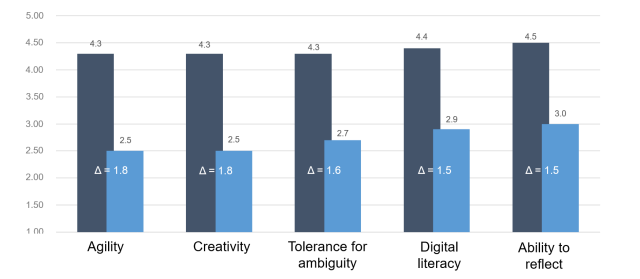Thought Piece on Future Skills in Higher Education
The Delphi Survey on Future Skills – Future Learning and Future Higher Education draws a clear picture when it comes to readiness of higher education institutions. The international experts‘ panel of 50 experts from academia and business converged in their views broadly and estimated that while future skills will become increasingly relevant and important within the next 5 years, higher education institutions are not prepared to support future graduates in developing them.
Background: Next Skills Study
www.nextskills.org published a study on “Future Skills – future learning and future higher education”. The study is outlining expert validated model of 16 future skill profiles for future graduates. It follows the rational that higher education as a system is standing at a breaking point of development challenges and outlines drivers and four future scenarios. Amongst the questions experts were asked to rate and comment on higher education institutions‘ readiness to support future skill development. The study resulted into a number of issues related to future learning concepts in higher education, strategies for future profiles and future skills for future graduates (full report and executive summary here: https://nextskills.org/future-skills-report-2019/).
Lacking Readiness of Higher Education Institutions
Research resulted into a defined set of 16 future skill profiles which are rooted into a clearly structured and well-described set of three dimensions.

Fig.1 Future Skill Model (more at nextskills.org)
Download key Finding or full report on Future Skill Delphi here.
The future skill profiles were validated and rated through Delphi experts – both on their importance, as well as on experts’ opinion about higher education readiness to adopt those future skills into their mission and every day practice. Both variables were assessed on a five-point Likert-scale, whereby importance ranged from 5 = “very important” to 1 = “not important” and support from 5 = “very good” to 1 = “very poor”. To gain an overview on the discrepancy between skill’s importance and its respective level of support in higher education, we calculated the delta, subtracting the mean support from the mean importance.

Fig 2: Subject and individual development related skills: Importance (dark blue bars) versus current degree of higher education support (light blue bars) (N = 46)
All individual development-related Future Skills are perceived as important, with autonomy being rated as very important (M = 4.53, SD = 0.62). Autonomous learning competence (M = 4.48, SD = 0.69) and self-management (M = 4.46, SD = 0.72) occupied the second and third most important positions. Contrary to that, the degree of implementation in higher education, expressing the evaluation of experts how well HEI are equipped to support the development of these skills is rated low. The delta between both values has been calculated. It shows that the largest discrepancy is perceived for the autonomous learning competence (Δ = 1.83) and autonomy (Δ = 1.81) – two of the skills that earlier had been rated among the most important.

Fig. 3: Object-related skills (Instrumental skills): Importance (dark blue bars) versus current degree of higher education support (light blue bars) (NImportance = 44, NSupport = 45)
Object related skills are skills which are relying on individual dispositions to act in unknown future environments but where the object of action is not the individual itself but a certain object which needs to be acted upon – e.g. a certain task. The experts rated all skills to be important, except for the ability to reflect, which was even voted to be very important (M = 4.50, SD = 0.67). Furthermore, the data reveals that the ability to reflect is one of the currently best-supported skills in HEIs compared to the other object-related skills. Least support apparently exists for agility and creativity skills (M = 2.53, SD = 0.87; M = 2.52, SD = 0.85), leading to the highest perceived discrepancy between agility skills’ importance and their current support through HEIs.

Fig. 4: Organization-related skills: Importance (dark blue bars) versus current degree of higher education support (light blue bars) (N = 45)
Individual organization related skills are those skills which are needed to act in organizational and social environments. In this section all skills are perceived of as important, whereby cooperation and communication skills are even rated to be very important (M= 4.59 SD = 0.67; M = 4.67, SD = 0.67). While being rated highly important, the discrepancy in experts judgement reveals that higher education institutions are found not to be ready for supporting their development.
Read the report on „Future Skills – Future Learning and Future Higher Education“ to find out what experts suggest in order to turn higher education institutions into future skill ready organizations – chapter 7.
[1]One popular theory to explain the rising trend in inequality was first put forward by the Dutch Nobel Prize winner in Economics Jan Tinbergen over four decades ago.He characterized wage inequality as being the outcome of a “race between education and technology”. In this theory, technology increases the relative demands for more skilled labour while education increases the relative supplies of such labour. Thus, rising inequality implies that technology is winning this race.
Ulf-Daniel Ehlers, 21 March 2019

Du muss angemeldet sein, um einen Kommentar zu veröffentlichen.